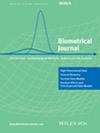A New Logistic Model With Subject-Specific and Serially Correlated Time-Specific Distribution-Free Random Effects on the Unit Interval for Longitudinal Binary Data
Abstract
Various beta-binomial mixed effects models have been developed in recent years for longitudinal binary data; however, these approaches rely heavily on the parametric specification of beta and normal random effects. Furthermore, their incorporation of normal random effects into beta-binomial models has been done at the sacrifice of certain computational convenience and clear interpretation with beta-binomial models. In this paper, we introduce a new model that incorporates subject-specific and serially correlated time-specific distribution-free random effects on the unit interval into logistic regression multiplicatively with fixed effects. This new multiplicative model facilitates the interpretation of random effects on the unit interval as risk modifiers. This multiplicative model setup also eases the model derivation and random effects prediction. A quasi-likelihood approach has been developed in the estimation of our model. Our results are robust against random effects distributions. Our method is illustrated through the analysis of multiple sclerosis trial data.


 求助内容:
求助内容: 应助结果提醒方式:
应助结果提醒方式:


